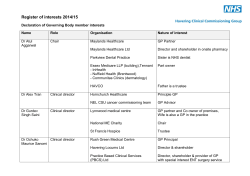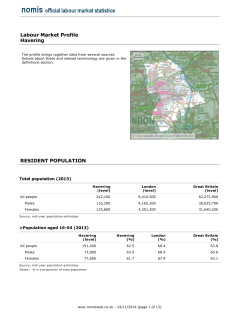
Future joint lobbying arrangements PDF 123 KB
Cabinet 13 May 2015 Subject Heading: Future joint lobbying arrangements Cabinet Member: Councillor Roger Ramsey CMT Lead: Andrew Blake-Herbert, Group Director, Communities and Resources Report Author and contact details: Brian Partridge, Interim Corporate Policy and Community Manager, brian.partridge@havering.gov.uk, extension 1004 Policy context: The Corporate Plan 15/16 provides that the Council will work in partnership with others to: Financial summary: Is this a Key Decision? Maximise funding for Havering through lobbying and attracting other external funds Deliver vibrant economic growth Reduce A&E attendance and unnecessary hospital and care home admissions by providing high quality, integrated community health and social care services (with health partners) Work with education partners to equip Havering’s young people and adults with the skills needed by local businesses Work with partners, including Transport for London and Crossrail, to improve transport links and interchange facilities The annual joining fee for the North East London Strategic Alliance (NELSA) is set at £10k per annum. This can currently be met from economic development budgets. No. When should this matter be reviewed? A review should be undertaken at the end of the first year of membership, to evaluate outcomes delivered by NELSA. Reviewing OSC: Overview and Scrutiny Board Cabinet 13 May 2015 The subject matter of this report deals with the following Council Objectives Havering will be clean and its environment will be cared for People will be safe, in their homes and in the community Residents will be proud to live in Havering [X] [X] [X] SUMMARY The report outlines proposals to formally establish NELSA (NELSA’s objectives are set out on page 3 of the report) and seeks approval for the Council to join. This report also outlines discussions taking place about the wider devolution agenda. RECOMMENDATION That Cabinet agree that the Council become a founder member of NELSA and authorise the Group Director, Communities and Resources to approve and execute membership documentation following consultation with the Director of Legal and Governance. REPORT DETAIL 1. NELSA is a newly formed, politically-led strategic partnership, at present consisting of Barking and Dagenham, Enfield, Newham, Redbridge, Waltham Forest and Havering (as an observer to date). Its main purpose is to lobby for a fair deal for NE London, particularly in terms of ensuring sufficient infrastructure investment to support NE London and to be a strong voice for the sub region. It has not yet been formally constituted, but discussions on the governing documents are at an advanced stage (the latest draft protocol appears at Appendix 1 – alongside this, a legal funding agreement is proposed) and the above authorities have been invited to sign up to it (letter attached as Appendix 2), at an annual cost of £10k per authority. (No proposals are yet in place as to how this funding might be used, but it would include promotion of the partnership and commissioning of research as agreed by the proposed Leaders’ and Mayors’ Board). Cabinet 13 May 2015 2. NELSA came into existence after the dissolution of the North London Strategic Alliance, which was established in 1999 as the sub-regional strategic partnership for North London. Membership included Enfield, Hackney, Haringey, Islington, Redbridge and Waltham Forest. In early 2014, Hackney, Haringey and Islington withdrew and the decision was taken to dissolve the partnership. 3. The purpose of the NELSA partnership is to develop a clear vision and voice for North East London, to work together to raise awareness of the challenges faced by the North East London boroughs, to lobby to obtain the necessary infrastructure and investment and to pursue shared opportunities. This new grouping met in July 2014 to discuss options for the way forward. The potential members all agreed that they would like to pursue this as an option for a strategic partnership. Alongside this, East London Solutions had also been considering how to increase strategic collaboration on economic regeneration. 4. The NELSA protocol is drawn up as a non-legally binding protocol which the Council can leave on giving 3 months’ notice. The objectives of NELSA are set out as being: 5. To provide a sub-regional voice for north east London via research and by building consensus around the needs and opportunities of the subregion; raising its profile and making the strategic case for public and private sector investment. To work through existing partnerships and develop new partnerships, as may be required, to implement the agreed vision for NELSA in order to encourage and foster the delivery of new homes, jobs, improved skills, transportation and better public services for the benefit of north east London and London as a whole. To act as ambassadors for the area, influencing key decision-makers, the development of policy in London and co-ordinating relationships between north east London and regional and central Government There are already in place a number of geographical groupings across London, comprised of authorities of differing political complexions, which exist to lobby for improvements in their areas including: The West London Alliance (Barnet, Brent, Ealing, Harrow, Hillingdon and Hounslow) – their vision for growth is to be "a thriving and prosperous part of the premier world city, with successful residents and resilient communities." Central London Forward which was established as a sub-regional strategic organisation in 2007 (Camden, Islington, Lambeth, Southwark, Wandsworth, Kensington & Chelsea, Westminster and the City of London) – their primary objectives are to influence policy on major issues affecting Central London; promote the strategic importance and needs of Central London and to identify and facilitate coordinated working on areas of mutual interest to partners Cabinet 13 May 2015 The Growth Boroughs (Barking and Dagenham, Greenwich, Hackney, Newham, Tower Hamlets and Waltham Forest) – their vision is that within 20 years the communities which hosted the 2012 Games will have the same social and economic chances as their neighbours across London and have priorities relating to creating wealth and reducing poverty; supporting healthier lifestyles and developing successful neighbourhoods. 6. It can be seen from the above that, apart from the proposal to establish NELSA, there is no organisation bringing all the North East London Boroughs together to lobby for improvements in the sub-regional area. Without NELSA, Havering, along with Redbridge and Enfield, would be at risk of becoming increasingly isolated. In addition participation in this grouping may assist the Council in accessing European Funding and in being in a better position if the devolution discussions progress - for these reasons NELSA is an attractive proposition. 7. The North East London authorities have positive reasons for working together as they share a number of common attributes: a. Areas of relative deprivation compared to West and Central London b. The need for improved transport infrastructure c. Skills gaps and the need to improve aspirations and educational attainment d. Growing populations and historic underfunding of the health agenda e. Lower funding levels. Havering has one of the lowest grants per head in the capital which does not reflect the external pressures or the demographics of the Borough 8. Alongside the above issues, the authorities collectively have great prospects for economic growth and job creation, all of which are strong reasons for them to be working together to lobby collectively. NELSA is the right vehicle to achieve this. 9. From a Havering perspective, the Council faces a number of challenges arising from population growth (including an aging profile which is older than London as a whole and significant increases in the younger population), an increasing demand for services (e.g. people with complex health and social care needs, migration of families from Central London with complex care needs, demand for school places etc.) and from austerity. NELSA provides the Council with opportunities to lobby effectively to maximise funding for the Borough, as set out in our Corporate Plan, and to make the case for the right infrastructure and support for North East London generally and Havering specifically. 10. NELSA will give Havering a stronger voice operating collectively as part of a strategic grouping when it comes to cross borough matters such as transport and health funding, than it will have operating alone, as a single voice. As mentioned above, the Council can give 3 months’ notice to leave the alliance and the only contractual commitment proposed to be entered into relates to the management of the funding. The final draft documentation Cabinet 13 May 2015 will be reviewed by the legal team to ensure that it is acceptable to the Council. NELSA is not about merging with other local Councils or sharing existing services or resources. For all the above reasons it is proposed that the Council formally commit to joining NELSA. 11. Members will be aware that there have been discussions in East and North East London on the devolution agenda leading to the issuing of a Leaders and Mayors discussion document “Local London – Driving growth through devolution.” Devolution is all about seeking additional powers and finance from Government which can then be administered at a local level. 12. Where devolution deals have been granted, these have been within existing regions which have a long history of joint working. For example, Greater Manchester (GM) has secured a devolution deal to deliver economic growth and improved public services and more recently to take control of £6bn of health and social care spending (with a “roadmap” for full devolution of powers and budgets to commission services including acute and specialised services, primary care, community and mental health services, social care and public health). The Sheffield City Region has negotiated a deal that includes greater powers over transport, skills and housing, without the imposition of a directly elected mayor and West Yorkshire has also recently negotiated a deal which includes control of the region’s adult skills budget and a share of the apprenticeship grant for employers. 13. London Councils has been making a case for greater devolution of powers to London as a whole and the delegation of responsibilities in relation to a range of public services. Its core proposition is that London should have significant responsibilities devolved from the national level, to stimulate economic growth and to deliver more effective outcomes. This includes proposals in relation to skills, employment, crime, community safety and criminal justice, housing and health. The Government announced in the recent budget that the Greater London Authority would have new devolved powers to jointly commission the Skills Funding Agency in a similar way to Manchester and Sheffield. 14. Governance in London is proposed through Borough Leaders and the Mayor, building to some degree on existing joint arrangements. London Councils has stated that in implementing any proposals it would seek to pass on leadership of cross borough devolved services to the sub-regional partnerships of its constituent members. It also stated that over time and in negotiation, work could be taken forward to allow those confederations of sovereign boroughs to assume direct legal accountability for devolved programmes. At the Leaders Committee on 24th March the recommendation put forward was to explore the potential for streamlined governance in relation to newly devolved responsibilities. 15. Future arrangements for devolution will be shaped by the new Government following the General Election and further reports will be brought to Cabinet on this, as and when proposals develop. Cabinet 13 May 2015 REASONS AND OPTIONS Reasons for the decision: The reasons are set out in the report. Other options considered: Not to join NELSA at this stage, which is not recommended for the reasons set out above. To request Observer status at NELSA – this is unlikely to be agreed by the other participating authorities. IMPLICATIONS AND RISKS Financial implications and risks: Joining NELSA would incur an annual fee of £10k. The benefits of the proposal are explained in the report, particularly in sections 4 & 7. Legal implications and risks: The Council has power to enter into arrangements of this type under section 1(1) of the Local Authorities (Goods and Services) Act 1970 and section 1 of the Localism Act 2011. The 1970 Act authorises authorities to supply services to other authorities on terms to be agreed. Section 1 of the 2011 Act is the “general power of competence.” The membership agreement as drafted protects the interests of member authorities and the final draft will be reviewed by Legal Services prior to execution. Human Resources implications and risks: None. Equalities implications and risks: No equalities implications at this stage. BACKGROUND PAPERS None.
© Copyright 2025















